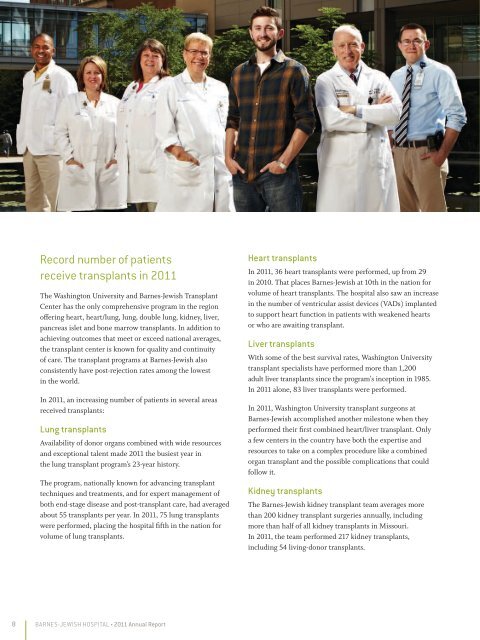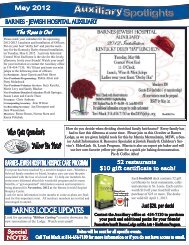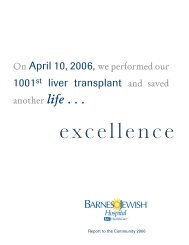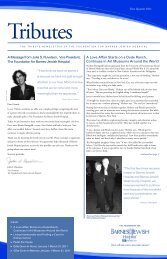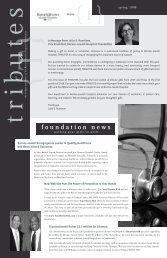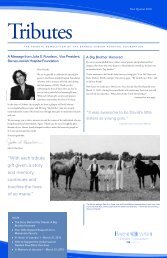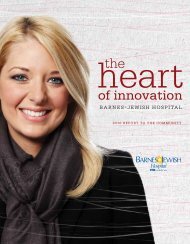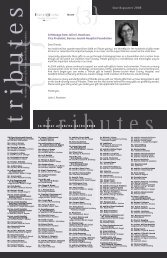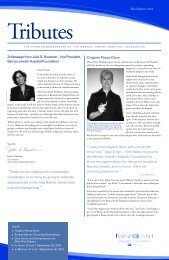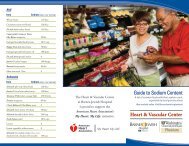D EFIN IN G M O M EN TS - Barnes-Jewish Hospital
D EFIN IN G M O M EN TS - Barnes-Jewish Hospital
D EFIN IN G M O M EN TS - Barnes-Jewish Hospital
- TAGS
- efin
- www.barnesjewish.org
Create successful ePaper yourself
Turn your PDF publications into a flip-book with our unique Google optimized e-Paper software.
Record number of patients<br />
receive transplants in 2011<br />
The Washington University and <strong>Barnes</strong>-<strong>Jewish</strong> Transplant<br />
Center has the only comprehensive program in the region<br />
offering heart, heart/lung, lung, double lung, kidney, liver,<br />
pancreas islet and bone marrow transplants. In addition to<br />
achieving outcomes that meet or exceed national averages,<br />
the transplant center is known for quality and continuity<br />
of care. The transplant programs at <strong>Barnes</strong>-<strong>Jewish</strong> also<br />
consistently have post-rejection rates among the lowest<br />
in the world.<br />
In 2011, an increasing number of patients in several areas<br />
received transplants:<br />
Lung transplants<br />
Availability of donor organs combined with wide resources<br />
and exceptional talent made 2011 the busiest year in<br />
the lung transplant program’s 23-year history.<br />
The program, nationally known for advancing transplant<br />
techniques and treatments, and for expert management of<br />
both end-stage disease and post-transplant care, had averaged<br />
about 55 transplants per year. In 2011, 75 lung transplants<br />
were performed, placing the hospital fifth in the nation for<br />
volume of lung transplants.<br />
Heart transplants<br />
In 2011, 36 heart transplants were performed, up from 29<br />
in 2010. That places <strong>Barnes</strong>-<strong>Jewish</strong> at 10th in the nation for<br />
volume of heart transplants. The hospital also saw an increase<br />
in the number of ventricular assist devices (VADs) implanted<br />
to support heart function in patients with weakened hearts<br />
or who are awaiting transplant.<br />
Liver transplants<br />
With some of the best survival rates, Washington University<br />
transplant specialists have performed more than 1,200<br />
adult liver transplants since the program's inception in 1985.<br />
In 2011 alone, 83 liver transplants were performed.<br />
In 2011, Washington University transplant surgeons at<br />
<strong>Barnes</strong>-<strong>Jewish</strong> accomplished another milestone when they<br />
performed their first combined heart/liver transplant. Only<br />
a few centers in the country have both the expertise and<br />
resources to take on a complex procedure like a combined<br />
organ transplant and the possible complications that could<br />
follow it.<br />
Kidney transplants<br />
The <strong>Barnes</strong>-<strong>Jewish</strong> kidney transplant team averages more<br />
than 200 kidney transplant surgeries annually, including<br />
more than half of all kidney transplants in Missouri.<br />
In 2011, the team performed 217 kidney transplants,<br />
including 54 living-donor transplants.<br />
The transplant programs at<br />
<strong>Barnes</strong>-<strong>Jewish</strong> consistently<br />
have post-rejection rates<br />
among the lowest in the world.<br />
Kidney/pancreas transplant<br />
In 2011, transplant surgeons performed 20 pancreas<br />
transplants, matched with a kidney transplant.<br />
<strong>Barnes</strong>-<strong>Jewish</strong> has extensive experience in kidney/pancreas<br />
transplant, with the first procedure performed at the<br />
hospital in 1989.<br />
Bone marrow transplant<br />
The Alvin J. Siteman Cancer Center at <strong>Barnes</strong>-<strong>Jewish</strong><br />
<strong>Hospital</strong> and Washington University School of Medicine<br />
has one of the 10 largest bone marrow and stem-cell<br />
transplant programs in the world, averaging between<br />
250-300 transplants per year. Survival rates are among<br />
the highest anywhere. It is one of two centers in the<br />
world developing a therapy for a rare form of leukemia<br />
called acute promyelocytic leukemia.<br />
Based on expertise in medicine, research and support<br />
services, the bone marrow and stem-cell transplant team<br />
also has developed a new way to get patients ready for<br />
transplant called conditioning therapy. The national and<br />
international medical community now recognizes this<br />
approach as a very important way of preparing patients<br />
for bone marrow and stem-cell transplant.<br />
When patients need extra help<br />
With the support of donor gifts, The Foundation for<br />
<strong>Barnes</strong>-<strong>Jewish</strong> <strong>Hospital</strong> offers extra help to patients<br />
undergoing transplant. For example:<br />
• Ms. M, an out-of-state patient, was diagnosed with a<br />
rare, progressive lung disease that required a transplant.<br />
By the time she arrived at <strong>Barnes</strong>-<strong>Jewish</strong>, she had no<br />
LEFT: Pictured with lung transplant patient Rory McCue<br />
(center) are members of his transplant team including<br />
(from left) Larry Sylvester, respiratory therapist;<br />
Stacie Rupp, post-transplant coordinator; Rebecca Bathon,<br />
social worker; Wanda Panus, pre-transplant coordinator;<br />
Elbert Trulock, MD, medical director of lung transplant;<br />
and Charles Dey, chaplain.<br />
RIGHT: William Chapman, MD, professor and chief of<br />
transplantation and general surgery at Washington<br />
University, leads a transplant team performing<br />
a liver resection. From left: Meranda Scherer, RN;<br />
T. Mark Earle, MD; Enjae Jung, MD, surgical resident;<br />
Chapman; and Ashley Kerkemeyer, RN.<br />
way to pay for lodging because she had been too weak to<br />
work. The Foundation provided Ms. M and her caregiver<br />
a safe, comfortable place to stay near the hospital before<br />
and after her transplant.<br />
• Mr. C, a liver transplant recipient, needed post-transplant<br />
medicine while awaiting the results of his Medicaid<br />
application. The Foundation purchased two months of<br />
the lifesaving medication until his insurance was approved.<br />
• Mr. B, a lung transplant recipient who lived out of town,<br />
needed to return to <strong>Barnes</strong>-<strong>Jewish</strong> for additional care<br />
after transplant. He had no way to pay for transportation,<br />
lodging and other expenses. The Foundation provided<br />
Mr. B with the means to arrive at the hospital, a close<br />
place to stay and the first 30 days of his new medication.<br />
8 BARNES-JEWISH HOSPITAL • 2011 Annual Report<br />
D<strong>EF<strong>IN</strong></strong><strong>IN</strong>G MOM<strong>EN</strong><strong>TS</strong><br />
9<br />
TR ANS PL ANT


